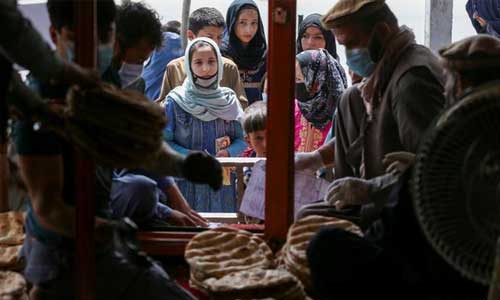The covid-19 outbreak has left serious social, economic and health impact throughout the world, especially on weak countries such as Afghanistan. As the infrastructure and superstructure of Afghanistan has been largely weakened as a result forty years war and conflicts, Afghanistan has been more vulnerable against covid-19 and so it seriously damaged the social, economic and health facilities of the country. In the other word, given the war-torn condition of Afghanistan, it was already suffering from poverty, unemployment, social insecurity and so on but the covid-19 outbreak has worsened everything inflicting severe blow on all aspect of health, social and economic lives of Afghan people. Economically, the level of poverty has increased from estimated 50% up to 90% as recently the president acknowledged in a ceremony. Health-wise, more than forty thousand people have been infected by covid-19 while a large number remained unregistered with numerous has died. As the economic and health implications of covid-19 has been repeatedly discussed, this article going to focus on the social impact of covid-19 on Afghanistan society.
The social impact of covid-19 can be divided to two period of times: during quarantine and after quarantine. During quarantine, we can address some positive impact of covid-19 on Afghan society such as increase of social sympathy, new experience of distant education, decrease of social crimes, rise of health awareness and so on. In regard to social sympathy, there were many commercial and charity organizations who voluntarily and bravely commenced services such as distributing masks, food, raising health awareness etc. These showed that Afghan people get more sympathetic and more integrated at hard times. Concerning reduction of social crime during quarantine, there were no prominent statistics or social complains about social crimes. Even, during quarantine on 15th April, 2020, the vice spokesperson of ministry of interior, Marwa Amini, informed of social crime reduction.
The social crime reduction during quarantine was also linked to religious reaction against covid-19 in Afghanistan. The religious scholars interpreted it as curse of God inviting people to pray and repentance. Serious and unserious religious people tried to repent so as to escape from God anger. At beginning of covid-19 outbreak, a large number of people walked out on the streets chanting “Allah Akbar” slogan. Some traditional believers advised to drink black tea for treatment while others preached to find hear inside Quran for treatment.
There were also a group of naïve religious scholars who called it a rumor planned for weakening the faith of Muslim people. In the meanwhile, there were also some rational and scholarly reaction against covid-19. For example, Ustad Saiyaf said it is a divine experiment encouraging people to pray and repent but also observe the health guidelines such as washing hands, social distance and so on.
As aforementioned, the social impact of covid-19 on Afghan society can be divided to two period of times: during quarantine and after quarantine. After quarantine, its impact was very dreadful; a large number of local companies bankrupted; the level poverty and unemployment were dramatically increased; the social crimes including street robberies, armed robberies, targeted killings, kidnappings, drug trafficking, addiction and so on have unprecedentedly enlarged in the big cities. Even, the security officials acknowledged their inability to curb this much high level of crimes asked for people support.
People wrathfully asked where are the security officials? why the security of Kabul was so fragile and what factors were disrupting security in the capital, and why the authorities, despite all these many repeated incidents, had not been able to curb the insecurity in Kabul and other large cities? the persistent waves of complains and concerns of people have eventually enforced the second vice president to take the supervision or responsibility of Kabul security hoping to produce positive changes in Kabul security system.
According to experts, despite higher level of poverty and hunger in Kabul, there are various reasons behind social crime in Kabul such as lack of intelligence information, lack of technical equipment and facilities, lack of security cameras, lack of scanners at the gates of Kabul, lack of enough security checkpoints inside the city, lack of skills and ability of police how to detect explosives and terrorists inside Kabul. As a result, police and other forces are unable to detect armed robbers and explosives embedded in a vehicle. So, this requires special technology, and the government should invest heavily on proving and updating the security systems with modern facilities. Another issue that makes the security of Kabul city vulnerable is the issue of political interference of government officials, lawyers and politicians in the appointment of security personnel in Kabul. For this reason, in most of Kabul’s security posts, individuals are appointed on the basis of ethnic, group, and political allegiance, not on the basis of their skills, professionalism, capacity, courage, and commitment to Afghanistan.
the last but not least impact of covid-19 in Afghanistan increase of poverty which directly linked to rise of social crimes. Undoubtedly, covid-19 is a global threat and naturally it excludes no one and no country but poor people and war-torn country such as Afghanistan are more vulnerable than others. The media news indicates that thousands of families are extremely in danger of war, virus and starvation in most parts of the country, especially Hilmand province which witnessed a large number of family replacement in recent days. with closing to the cold season most people do not have dry bread to survive, let alone to rent shelters, purchase fuels, provide medicine or nutritious food to fight against second wave of the covid-19 or winter coldness. If the second wave of the covid-19 becomes serious, it could farter complicate the situation as it is too hard for the poverty stricken people to carry the burden of disease, war poverty, people replacement and high prices of goods at the same time.
Home » Opinion » The Social Consequences of Covid-19 in Afghanistan
The Social Consequences of Covid-19 in Afghanistan
| Mohammad Zahir Akbari

